A string of British universities has established links with higher education institutions in a country whose human rights record is widely condemned as one of the worst in the world, with the full support of the British government.
One – the University of Westminster – has set up a campus in Uzbekistan and at least five others – Cambridge, Bath, the University of East Anglia, the London College of Fashion and London Metropolitan University – have established partnerships with colleges in the country.
The links were supported by the British Council and welcomed by the Foreign Office in the years after the 9/11 attacks as the UK tried to bolster relations with a strategically critical central Asian state that had formerly been a part of the Soviet Union, and which is a key transit point in Nato's supply lines to Afghanistan.
During that period, Uzbekistan's human rights record remained abysmal, according to Amnesty International and Human Rights Watch (HRW), and is said in some respects to have deteriorated. Several hundred demonstrators were shot dead in 2005; Muslims who practise their religion outside state controls continue to face imprisonment and torture, as do the country's small number of Jehovah's Witnesses; human rights activists and journalists are frequently imprisoned on false charges; more than a million people are mobilised for forced labour each year.
In 2002 there were reports – considered by both the Foreign Office and US state department to be credible – that two members of a banned Islamist party had been boiled alive.
The disclosure of UK universities' extensive Uzbekistan links comes two years after an inquiry by Lord Woolf, the former lord chief justice of England and Wales, concluded that the London School of Economics' highly damaging relationship with the Gaddafi regime in Libya could be attributed to multiple failures of governance and management.
Some of the UK universities connected to Uzbekistan are reluctant to discuss its human rights record. Questions about the country appear to cause particular discomfort at the University of Westminster – whose satellite college in Tashkent was headed for nine years by a former KGB officer, and where there are allegations, disputed by Westminster, that Uzbek security officers are not only allowed on campus, but are placed on the payroll – and at the London College of Fashion, which forged links with a number of Uzbek institutions despite the country's use of child and forced labour to bring in the cotton harvest each autumn.
The British Council defends the work it has done to develop educational links with a country with such a widely condemned record, however, saying it sought always to continue operating in countries during difficult times. "We believe it is better to have positive engagement, particularly with the next generation of leaders in education and culture, rather than to isolate people in a country and the UK from valuable contact and discussion," a spokesperson said. "We do understand that some people may not wish to engage with certain regimes and we respect their individual choices; we also respect the fact that others will want to engage."
HRW's Central Asia researcher, Steve Swerdlow, said that nobody involved in the establishment of the university contacts could seriously claim to be unaware of the regime they are dealing with. "Whether it's Downing Street or a prestigious educational institution, no one in London is under any illusions as to what kind of government they are dealing with in Tashkent."
The UK institution with the deepest relationship with Uzbekistan is the University of Westminster. After receiving what it describes in its guide to overseas partnerships as "advice from senior Diplomatic Corps regional experts", Westminster made a bid for a contract to set up a university in Tashkent, and won the contract following a tendering exercise brokered by the British Council in July 2001.
The Westminster International University in Tashkent (WIUT) opened in 2002 in premises provided by the government of Uzbekistan. Since then it has offered courses in economics, business, computing and law. For the first nine years, the rector – appointed by the government – was a former KGB officer, Abdujabar Abduvahitov.
When the formal opening ceremony was held the following May, Tony Blair sent a letter to Uzbekistan's despotic president, Islam Karimov, to congratulate him on "an encouraging and positive project enabling us to build partnership through our shared value of higher education".
Westminster appears reluctant to answer questions about Uzbekistan's rights record. Asked whether it accepted that the critical reports of Amnesty, HRW and other NGOs were accurate, it replied that it was contributing to education reform by providing access to "internationally renowned education and learning opportunities".
Training of cadres
The university also defends its Tashkent satellite as being independent of Karimov's government. But Karimov appears to have a different view: last year the state-registered news agency UzReport said: "Westminster International University in Tashkent was established on the initiative of the President of Uzbekistan … as part of the implementation of the national programme for training of cadres."
An insight into WIUT's close relationship with Karimov's regime was provided when a cable that the then US ambassador to Tashkent, Jon Purnell, sent to Washington in 2006 was subsequently leaked to WikiLeaks and posted on the internet.
Purnell reported that the first deputy rector at the WIUT had told one of his embassy's political officers that several senior members of staff at the university were officers serving with Karimov's fearsome internal intelligence agency, the National Security Service (SNB). Furthermore, Purnell wrote, the rector, Abduvahitov, was a former head of the SNB in the region of eastern Uzbekistan where the 2005 massacre took place. A year after the killings, Purnell reported, this man took leave from the university and returned to the region, "under the guise of 'supervising local elections'", but more likely to assist with measures to ensure the anniversary "passes smoothly".
The first deputy rector who was being quoted by the US ambassador is Alan France, a British academic who was formerly dean of Lancashire Business School, and who was appointed by the University of Westminster, rather than by Karimov's government. France told the Guardian that he could recall his talk with a diplomat at the US embassy - "I'm shocked to find my conversation being reported back" – but denied having described any of his Uzbek colleagues as serving intelligence officers. "That is an interpretation of what I said," France said.
Four days earlier, the University of Westminster told the Guardian it knew of no link between the rector of its Uzbekistan college and the country's intelligence services. "There is no known connection with the intelligence services," it said in a written statement. But according to the university's man in Tashkent, that claim is simply wrong. "It's no secret that Abdujabar had a past," said France. He added that it was known that Abduvahitov – who has since left the WIUT – had been a KGB officer in Uzbekistan prior to the breakup of the Soviet Union.
Asked whether Abduvahitov had taken leave from the university to return to eastern Uzbekistan on the first anniversary of the 2005 massacre, France said: "I can't remember that far back. But I can't remember him having a substantial period away." Nor could he be certain that SNB officers were not present at the university. "I have no guarantee who's on this campus," he said. But he added: "Categorically, they are not on the payroll." Asked about the commercial value of its activities in Uzbekistan, the University of Westminster insisted that "any commercial arrangements are confidential". According to the US ambassador's cable, in 2006 the university was receiving $3.5m a year from an Uzbek government scholarship fund.
War on terror
Uzbekistan has been a staunch political ally of the west in the so-called war on terror, and is no longer a formal military ally of Russia. Its importance to Nato was enhanced by the construction of a railway line into northern Afghanistan in 2010; the military supply line known as the Northern Distribution Network became vital when Pakistan briefly barred convoys from crossing its territory in 2011.
Asked about the Foreign Office's role in encouraging greater UK educational links with Uzbekistan, the British Council insisted that its decision to operate in any country is taken by its board of trustees in line with its charitable objectives. Although the rules that govern the council's activities are drawn up by the Foreign Office, and require it to act in accordance with the British government's long-term international aims as well as its charitable objectives, the FO also sought to play down its role in the establishment of the educational links.
The Foreign Office spent more than two weeks considering questions from the Guardian about any role it played in encouraging UK universities to forge links with Uzbekistan before replying that it had had "no direct involvement" in the establishment or running of Westminster's Tashkent college, or any of the other partnerships. But it did welcome these projects: "Educational links between the UK and Uzbekistan can help improve education standards, give young people access to British education, culture and ways of doing things. They also increase people-to-people contact and understanding."
However, human rights groups say that these links – which they describe as engagement without strings – have compounded what they believe is now a human rights crisis. In its most recent report on the country, HRW condemned the US and European governments for conducting diplomacy that it said was "driven by a short-term interest in Uzbekistan's strategic importance as a conduit of supplies and troops for the war in Afghanistan". Furthermore, it said that Uzbekistan's human rights record could only deteriorate as a result.
Swerdlow, HRW's regional researcher, added: "Over the last few years, the policy of 'quiet diplomacy' with Tashkent has emboldened Uzbek authorities to continue to crack down on independent civil society. What is needed now is a principled engagement – one where there are meaningful policy consequences to the bilateral relationship for serious rights abuses."
Other British universities have forged links with higher educational institutions in Uzbekistan as part of a British Council project called Inspire: International Strategic Partnerships in Research and Education. The London College of Fashion (LCF), part of the University of the Arts London, entered into a partnership with the Tashkent Institute of Textile and Light Industry, aimed at developing design and marketing skills, and with two other colleges in Uzbekistan.
Some senior staff at the LCF appear to have been unaware that they were dealing with a country that deploys forced labour to bring in its cotton harvest. Once again this autumn, school pupils, students, and even doctors and nurses are being forced into the fields across Uzbekistan to gather the country's most valuable crop – although HRW believes that fewer children under the age of 15 have been mobilised than in recent years.
Craig Murray, the former British ambassador to Tashkent who was removed from his post after publicising Britain's use of intelligence extracted through torture in Uzbekistan, described in his book Murder in Samarkand how he visited a university and found it to be deserted. "The authorities had not wanted me to visit the university because of its resemblance to the Marie Celeste," he wrote. "They were all in the fields picking cotton."
Those forced into cotton picking endure poor living conditions in barracks, receive little or no pay, and face punishment such as beatings or denial of social benefits if they refuse to work. There are regular reports of deaths during harvesting, including one media report last monthof a six-year-old boy suffocating under a cotton bale.
Asked about its activities in Uzbekistan, the LCF said its work, which had been funded by the British Council, was completed. It declined to disclose the value of the contract. The college added that there was "sometimes a difficult balance to be struck" when considering whether to work in a country like Uzbekistan; it had carefully considered the ethical implications "and in this instance felt that there was a considerable direct benefit to the craftspeople of Uzbekistan".
The LCF also denied having any relationship with President Karimov's daughter Gulnara Karimova – whose interest in fashion design is well-known – and who was described in another cable written by Purnell and leaked to Wikileaks as "the single most hated person in the country". The LCF issued this denial despite evidence that senior college staff attended a number of fashion shows and round-table discussions organised by Karimova's cultural foundation.
London Metropolitan University has links with a number of Uzbek institutions, including the University of World Economy and Diplomacy, where Gulnara Karimova holds a professorship. In a statement, London Met said it was aware of the country's record, but that it was committed to both the exchange of ideas and the raising of educational standards. The university also said it had trained Uzbek human rights activists, but did not respond to a request for further details.
London Met declined to disclose the value of the grants it was receiving from the European Commission or the British Council. Nor would it say whether it was aware that students at University of World Economy and Diplomacy say they are interrogated by the SNB if they are heard expressing political opinions.
According to Human Rights Watch, London Met's partner college is a potentially dangerous place for students to speak their minds. "The security services have clamped down on free thought in universities, interrogating students who appear to question the conduct of their government, or simply inquire into the human rights situation in the country," says Steve Swerdlow.
Cambridge University said that a history project that its Centre for Development Studies is running in collaboration with the Tashkent State Institute of Oriental Studies is now in its third year. It too is funded by the British Council. Cambridge would not disclose the size of the grant, however, and nor would it address questions about Uzbekistan's rights record.
The University of Bath received £44,000 from the British Council for assisting with the development of business studies at Tashkent State University of Economics for three years from 2010. It said: "Working to improve academic standards is an apolitical act and in no way constitutes support (tacit or explicit) for the political regime of the country. The work … was carried out in a collegiate spirit of helpfulness and support. It reflects the capacity of higher education in the UK to strengthen civil society."
The University of East Anglia said its three-year collaboration with the Uzbek State World Languages University and Andijan State University, funded with a £45,000 grant from the British Council, had helped train thousands of language teachers before concluding earlier this year. "When entering international partnerships, the university considers carefully whether the humanitarian benefits outweigh the disadvantages," a spokesman said. "The aim of this project was to assist in the development of the education system in Uzbekistan to the advantage of Uzbek teachers and students."
Privately, senior academics at some of the universities are dismayed that the British Council and the Foreign Office did not do more to warn them about human rights abuses in Uzbekistan, and say they had assumed the Council would not have suggested partnerships in a country with such a record.
"We clearly haven't exercised due diligence, and we should have done," said one. "But we didn't do so because the British Council rang us up and said, 'Hey do you fancy doing something in Uzbekistan?' It was the British Council, for God's sake."
Meanwhile, the Foreign Office's own assessment of Uzbekistan's human rights record is that it remains a matter of significant concern. The department's latest human rights report highlights the lack of political or religious freedom, the use of torture, the worsening climate for freedom of expression and assembly, and the use of forced labour, including child labour, in the cotton harvest.
Even members of the British embassy's own locally recruited staff are not safe from harassment, detention, and even torture.
Kayum Ortikov, who worked as a security guard at the embassy, says he was severely tortured during the 28 months he spent in prison after being arrested in December 2008, allegedly because he had refused to spy on British diplomats. According to human rights groups, the British embassy intervened and helped to secure his release only after the Independent on Sunday newspaper disclosed his plight.
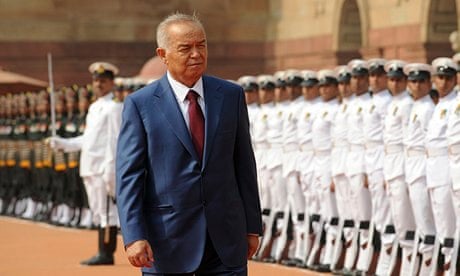
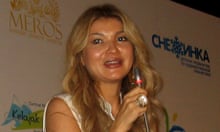

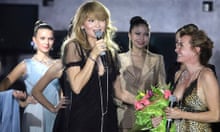
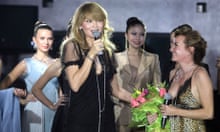
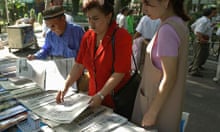
Comments (…)
Sign in or create your Guardian account to join the discussion